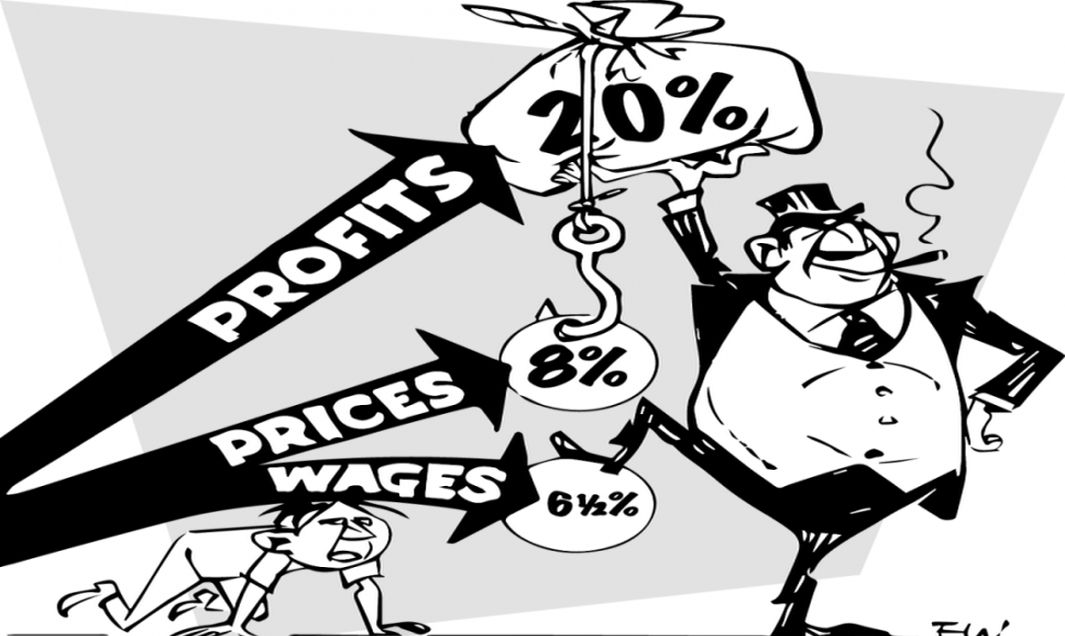This article is republished from the archives of ISA.
Increasingly commentators say that the strike wave affecting several countries, and the level of inflation eating away at workers’ wages are reminiscent of the 1970s. We republish an article from 1971 by Ted Grant, then a member of the CWI — predecessor of ISA.
The Tory government and the capitalist press, TV, and radio have been conducting a tireless and incessant campaign on the question of inflation blaming the trade union movement and the working class for the continuous rise in prices. It is the “greed”, “selfishness” and “hooliganism” of the workers in demanding wage increases up to 30 percent which is responsible for the economic plight of the country! The constant refrain is blared out “if wages go up, prices go up, everybody including the people who get higher wages are worse off, and the old age pensioners, widows, and the sick are in dire distress.”
What is the truth of the matter? The nauseating hypocrisy of the commentators and Conservative ministers weeping crocodile tears at the plight of these people is only equalled by their stony-hearted refusal to take any measures to alleviate their condition. But what causes price increases? If the capitalists could arbitrarily raise prices, they would not wait for wages to rise. They are interested in gaining the maximum, profits. What stops them is competition, especially under modern conditions, nationally and internationally. In fact, in general it is wages which lag behind prices and not vice-versa.
If the capitalists could raise prices at their whim, why do they face the prospect of bitter strikes, with consequent loss of production and profits rather than concede the wage demands of the workers? If it was simply a question of passing on wage increases that would be the obvious way to solve the problem. But in fact, the profit of the capitalist class is only the unpaid labour of the working class. Consequently, an increase of wages for the workers, other things being equal, means a fall in the profit of the capitalists. Hence the cries of woe from the paid hacks of capitalism in the mass media.
The screams of anguish by the Tory MPs and the clamour of the CBI against “unproductive” and “parasitic” state expenditure arises from the fact that the money “spent” by the state can only be raised from taxation which either comes from the pockets of the workers or the pockets of the capitalists. By saving on such “wasteful” things as the social services more money can be syphoned off in the interests of big business.
The expenditure of the GNP by the state has increased from 37 percent in 1957 to 50 percent in 1969; this at a time, when at best the economy has been only slowly increasing. Hence the programme of the Tories ruthlessly to slash at the reforms of the post-war period at the expense of the working class and the very sections “defended” so zealously by the capitalist press and other organs of mass opinion, to their vociferous applause.
The capitalists can only make a surplus from the labour they employ. What Marx calls constant capital is the investment in machinery, buildings, raw materials and so on. This is “dead labour” which passes unchanged in the final product. With the development of technique, more and more has to be invested to exploit relatively less and less labour. Consequently, in spite of the increase in exploitation and the increased amount extracted from the workers there is a tendency for the rate of profit to fall. This year ICI, Fords, Courtaulds and many other giant firms have reported an actual fall in the amount of profit, despite in many cases an increase of investment.
Consequently, they wish to increase their profits by squeezing the workers, by increasing productivity, by more intensive labour and getting the Tory government to help them resist wage increases, and introduce anti-trade union laws to hamper and restrict the struggle of the workers for a better standard of living.
“Fictitious capital”
One of the main causes of the continuous fall in the purchasing power of the currency in Britain as in other capitalist countries is the “inflated” expenditure on armaments which in Britain consumes more than £2,500 million. The workers in the Forces and armaments industry have to eat, live in houses, procreate, have recreation and all the normal activities of the working class. The capitalists in these industries have to make the average rate of profit, if not more. The expenditure is entirely unproductive, producing neither consumer nor capital goods. Consequently, it has to come out of the production of society as a whole. Hence the undermining of the currency. At the same time the national debt which has now reached the astronomical sum of £1,200 million to £1,400 million in payment for armaments destroyed in imperialism’s wars over the course of the last century, constitutes an enormous and parasitic drain on the economy.
Britain is not one special case. Inflation is rife throughout the capitalist world. It is aggravated in its consequences in Britain by the sluggishness of the economy due to the sickness of capitalism.
To cope with the price increases the workers in all these countries have demanded higher rates of pay. In the United States, despite massive increases in unemployment, many sections of the workers have won big increases ranging upwards from 14 percent. Wages in the Common Market countries will have increased by 14 percent this year, the highest increases for 12 years. In Italy wages increased by 18 percent and West Germany 15 percent.
In the past, one of the main arguments of the capitalist class and its publicists has been the low wages of their competitors, especially in Western Europe. Now Britain, because of the relative economic stagnation, is rapidly becoming a country of cheap labour, by comparison. The argument is still trotted out in the capitalist press, and the other means of publicity in the hands of the ruling class, that the employers cannot afford higher wages because of international competition. But it is the failure of the capitalists to invest the surplus extracted from the workers that is the real root of the problem. But capitalists will only invest if they can make an extra profit. Consequently, the potential of British science and technique has not been applied, and Britain, once the leading industrial nation, faces the very real threat of becoming an economic and industrial backwater in comparison with her rivals.
Meanwhile the measures of the government, like those of the former Labour government, restrict the market by taxes on the workers and the “economic and monetary squeeze”. This, plus low wages, gives no “incentive” to the capitalists to invest. This in turn becomes a vicious circle. The struggle of the trade union movement for higher wages can force the capitalists to invest in more machinery in order to economise on labour. Limiting wages merely results in super-profits for the capitalists.
The present economic upswing is the “best” period in which the workers can improve their standard of living. Consequently, the exhortations throughout the capitalist world from Norway to America by the bankers and industrialists and echoing them the governments, advocating prices and incomes policies or monetary squeezes, or a “firm stand” by governments and employers against what they term “unreasonable” wage demands. They try and find a “solution” to the capitalist inflationary sickness at the expense of the workers.
In America this disease has manifested itself in rising unemployment, falling or stagnant production and rising prices. The attempt to tinker with the economy on the advice of the capitalist economist witchdoctors has had this unprecedented result.
Keynesianism, the bible of the Labour leaders, (and a philosophy of inflation) has been completely discredited: the endeavours to operate on its precepts in Britain and America have been total failures. And now, the so-called “monetary” methods have had the results sketched out above. They take the elementary proposition that a given amount of currency would be necessary to move a given quantity of goods in a capitalist economy, at a fixed velocity of money, and that if under these circumstances, for example, the amount of currency notes were to be doubled, prices would also double. They then come to the conclusion that in a situation of inflation if the “money supply”, i.e. the issue of notes and credit, is cut down this would result in a proportionate fall in prices, or at the least stop the steady inflation of prices. They imagine that removing the symptom will cure the disease. In reality the fictitious capital engendered by armaments production, the rigging of the stock exchange, the phoney issuance of shares without real capital, buildings and machinery to back it, the waste of the Vietnam War, etc., are the cause of inflation in America and elsewhere. It is impossible to remove inflation without eradicating the causes: consequently, the attempt at a monetary squeeze in America has meant many bankruptcies, unemployment and rising prices. Inflation continues to mount. Industrial production has remained stationary or has dropped. In Britain the monetary squeeze, and the prices and incomes policy, resulted in high profits, an economic stop, low investment and rising prices.
Take over monopolies
Production is now painfully increasing at the rate of 2 to 3 percent in Britain. Capital investment is increasing equally lethargically. In America too, new investment has dropped to 2 percent! Unemployment in Britain has reached over 650,000 while prices are rising steeply. Even according to the official index, the cost of living has increased by 8 percent! Thus a tight monetary policy has meant low production, increased unemployment and higher prices.
The disease of the system is to be “alleviated” at the expense of the working class. But the organic sickness of capitalism, even if successful in this operation, would not be cured. It is the irrationality of production for profit and not for the benefit of the producers that is the cause of all the difficulties of the system nationally and internationally. The fight of the working class against the anti-union bill and against the social service cuts for a minimum wage of £20 a week, with the modest wage increases demanded by the workers with a sliding scale of wages to compensate for increased prices and lower hours to absorb the unemployed: these are minimum demands.
The long-term solution is not a new disastrous prices and incomes policy for the next Labour government as advocated by Lord George-Brown, and hinted at by Roy Jenkins and Barbara Castle, which will have the same results as the last versions of this policy, but a break with capitalism and capitalist policies. The nationalisation of the “commanding heights” of the economy with minimum compensation on the basis of need must be the programme of the labour movement.
Despite pleas of poverty by the capitalists, Britain still remains one of the wealthiest countries in the world. £120,000 million is the estimated total. Britain has the machinery, the science, the technique and the skill of the working class which could be harnessed and used for the production of abundance and decent standards for all. The only answer is the organisation and management of the economy by the working class in the interests of the working class.




